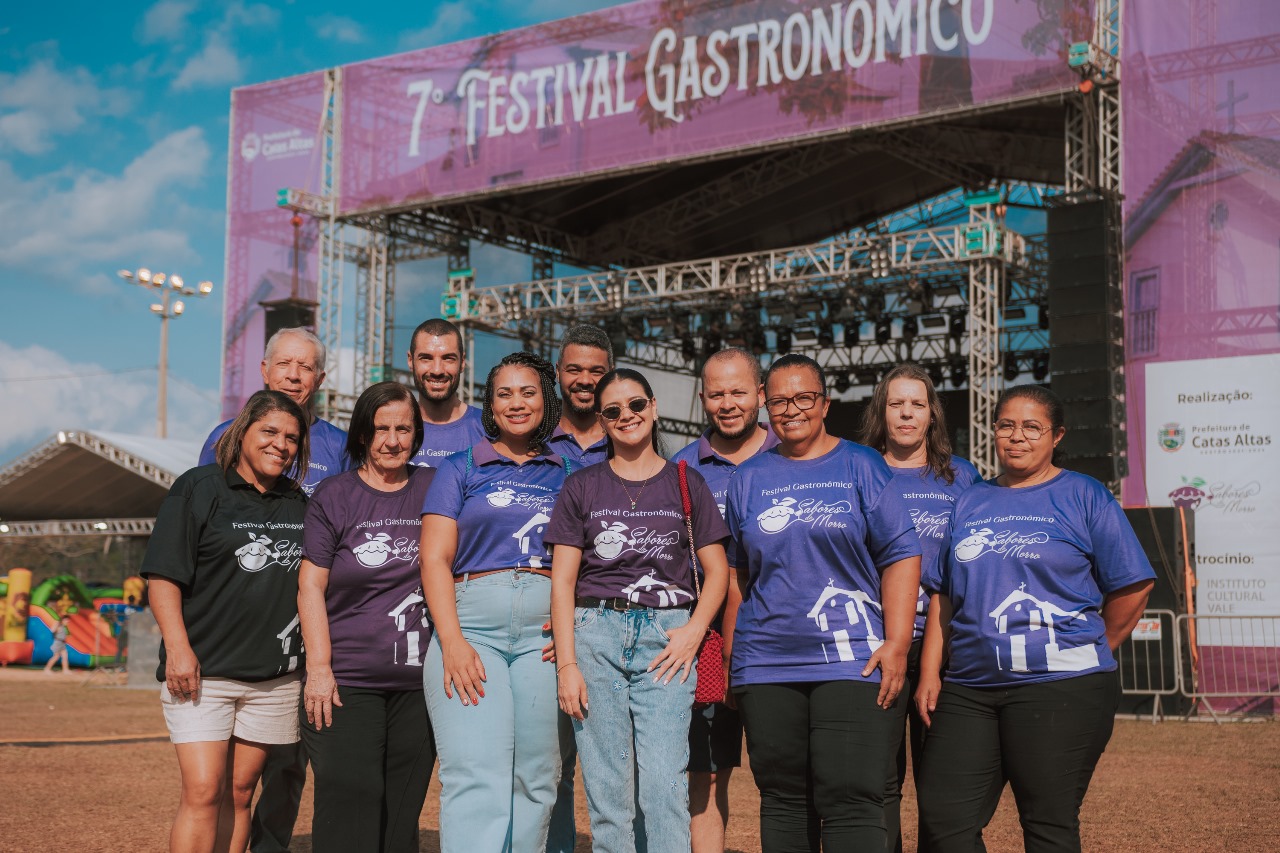
“We’ve come so far and we don’t even realize how quickly time has passed,” the words of Priscila Cristovam da Silva, a member of the Sabores do Morro Association, translate the emotion of looking back at a collective trajectory built on affection, hard work and a lot of willpower. To see how far the association of these women from Morro d’Água Quente, in Catas Altas (MG), now 10 years old, has come is also to celebrate the power of a territory that has transformed its gastronomic culture into a source of income, autonomy and identity.
The story began in 2015, when Raízes Desenvolvimento Sustentável started collaborating with the women’s group in the district. With institutional support from the Vale Foundation, we helped formalize the Sabores do Morro Association, provide technical training and strengthen the visual identity of the products. There was also the creation of the first Sabores do Morro Festival – which has since grown, won partnerships and become an annual event that moves the territory with culture, cuisine and female protagonism.
Since then, what was a simple fair has become a structured project, with active governance, its own brand, a presence on social networks and important partnerships. Which shows the power of associations!
In this edition of Papo com Beneficiárias, we hear from three women who have followed this journey closely: Priscila Cristovam da Silva, Glorinha Honorato and Nayara Suelen. Between achievements, challenges and dreams, they reveal how unity and belonging have been fundamental ingredients in this collective recipe that has lasted a decade.
Check out this chat below!
Priscila Cristovam da Silva
A founding member of Associação Sabores do Morro and owner of Taste Minas Gourmet, Priscila has been with the project from the start and is one of those responsible for bringing the region’s products to other audiences and markets. At the head of Taste Minas, which has been in operation since 2016, she produces handmade jams, jellies and sweets, especially casadinhos. In this conversation, she shares the achievements, challenges and dreams that continue to warm the Association’s history.
 Raízes DS: In 2015, Raízes helped create the first festival. After that, what was the biggest challenge in keeping the group together and the project going?
Raízes DS: In 2015, Raízes helped create the first festival. After that, what was the biggest challenge in keeping the group together and the project going?
Priscila Cristovam: It’s always very difficult to keep a group of people together who, despite having similar interests, have different personalities. This leads to conflicts. But we try to make it work because we have common goals, and that unites and strengthens us.
A: The festival has grown a lot over the years. What moments or achievements do you consider to be the most important in this trajectory?
P: There are many. We have been able to give value to our members with equipment, supplies, utensils and training. We have shown the seriousness of associativism, which promotes income generation for the community and we have supportive partners who have invested and are investing in this action to generate income, empower women and provide culture for our community. We had important names in our kitchen show, incredible bands on stage… We brought a lot of culture and leisure for families.
A: Taking part in the festival has always been a way of generating income and valuing women’s work. What changes have you noticed in your life, that of your family, and the other participants?
P: There have been many changes over the years. We were small producers who didn’t have a visual identity, who didn’t know how to standardize and price their produce. Today we are qualified producers and our products complement each other, they talk to each other and make up a beautiful gastronomic fair.
Glorinha Honorato
The cook of the Sabores do Morro Association and a beloved figure in the community, Glorinha is known for a dish that is a hit throughout the region: her traditional tropeiro beans. An active participant in the association and the fairs, she brings with her the taste of dedication and the pride of seeing the festival grow over the years.

Raízes SD: The festival involves a lot of effort, but also a lot of dedication and affection. What moves you the most when you look at everything that has been built up so far?
Glorinha Honorato: The growth! It’s like seeing a child that was born small and has developed with care and love until it becomes strong and solid.
R: Along the way, you have built important partnerships. What makes a partnership really make sense for you?
G: The right partnership is one that believes in our project and walks together, respecting and valuing our work.
A: After 10 years of history, what still remains to be achieved?
G: To have a stable headquarters and to continue growing with serenity and purpose.
Nayara Suelen
Producer and one of the organizers of the Sabores do Morro fairs and festivals, Nayara is one of those people who make things happen. With a keen eye behind the scenes and for the collective, she dedicates herself to building an event that mixes culture, income, affection, and belonging.
 Raízes DS: Are you proud to see how an event that started out small has become an important festival for the community?
Raízes DS: Are you proud to see how an event that started out small has become an important festival for the community?
Nayara Suelen: It’s great! The first fair was small and simple, but full of unity. That foundation was essential for us to get this far.
R: Since the association was set up, you have continued to work with the fairs and the festival. What has been most important in maintaining this continuity over time?
N: The perseverance of all the members, in unity. Seeking income for everyone and generating income in the district is our power.
R: What next steps do you dream of taking with Sabores do Morro?
N: The Association’s headquarters is still our dream. We’re studying this step very carefully. And who knows, maybe we’ll bring Paula Toller, Jota Quest, and Nando Reis to our festival in Morro d’Água Quente? Then I won’t be able to stand it (laughs).
10 years of flavors, strength, and affection
The Sabores do Morro festival is a living example of how collective strength and care for roots can transform realities. Raízes had the joy of being present at the first steps and is still proud to see how much this initiative has grown and continues to have a positive impact on the lives of so many women. Take a look back at the creation of the fair and the association with support from the Vale Foundation and the first Festival, a community initiative with support from Raízes.
Over the course of this decade, the Association has built its identity, strengthened its governance, established solid partnerships and become an example of solidarity economy and female protagonism. Today, it celebrates the past, values the present and is already cooking with affection for what is yet to come.
May there be more fairs, dishes full of history and flavors that feed not only the body, but also the soul and the territory.


